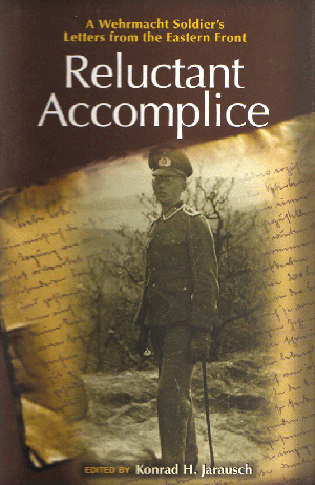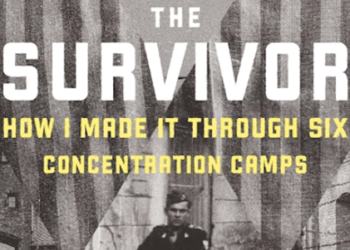Reviewed by NEAL GENDLER
It’s difficult or impossible to summon sympathy for a soldier in Hitler’s army — even one with no hatred for Jews — but the letters home of Konrad Jarausch do peel away stereotypes.
They reveal a deeply religious, 40-year-old, bespectacled scholar thrust into soldiering for which he is physically and temperamentally ill suited. He’s not a Nazi but a German nationalist complicit by serving with a belief that erodes with observation and experience.
The namesake editor, Konrad H. Jarausch, the Lurcy Professor of European Civilization at the University of North Carolina, Chapel Hill, was born in August 1941. He grew up like millions of German “half-orphans,” innocent progeny of a society justly condemned by the world, with a father he never saw but who “hovered like a phantom over my entire childhood.”
The editor says the more than 350 letters’ significance is his father’s “ambivalent role as a reluctant accomplice and clear-eyed witness…especially his conflicted attitude, hoping for and wanting to participate in a German victory while increasingly noting and being repelled by Nazi brutality.” But he doesn’t assert innocence; some letters reveal beating prisoner workers to get compliance, one saying: “My right hand is swollen from all the blows I dispense.”

The father was sworn into a reserve unit in Magdeburg on Sept. 1, 1939, the day Germany began the war. Too old for combat, he served in Poland, guarding prisoners of war and training other older recruits, and in the USSR, where he was charged with feeding captured Soviet troops.
Intellectual isolation may have been worse than physical discomfort for the co-publisher of a scholarly Christian journal who read his Bible and devotions daily — plus Socrates and Plato in Greek. In Poland and the USSR, he worked to learn the languages and cultures. Although not robust, and lacking most soldierly skills, he performed well enough to become a noncommissioned officer and an officer candidate. Candidacy ended with an unrepaired meniscus tear, and his efforts for discharge as an essential educator came to naught.
The letters contain longing for home and details of daily life, food, health, study, army stupidity and weather, plus appreciative descriptions of the countryside. They progress to showing discomfort with the harsh treatment of trainees and the squalid, lethal conditions of Russian POWs.
Jarausch appears to accept Germany’s idea of Lebensraum; if this devout Christian had moral qualms about dismantling Poland in favor of ethical Germans, I didn’t see it in his letters. But the context must be considered. He hints at official and self-censorship, often telling his wife he’ll say more in person. Whether he spoke of moral misgivings during his brief leaves home is unknown.
He is disturbed by poverty in the Polish and Russian countryside, and by war’s effect on the populations, saying: “We are living at the expense of these people and sucking them dry.” One letter calls the killing of civilians — particularly Jews — “already more murder than war.”
He frequently notes Jews’ condition, calling them “sordid…in their wretched humanity” but also “living in horrible squalor and misery.” He writes of paying a few pennies to the Jewish women — many “from good families” — forced to clean the NCOs’ quarters.
Jarausch gets put in charge of a kitchen to feed thousands of Soviet prisoners. But there never are enough calories to sustain them. (The U.S. Holocaust Memorial Museum says that by February 1942, two million of the 3.3 million Soviet POWs had died from starvation, exposure, disease and shooting.)
By January 1942, prisoners are dying of typhoid and Jarausch, who spends time with them, starts finding lice in his clothes. By Jan. 11, he’s come down with the disease and by Jan. 27, he’s dead.
A conqueror’s death from his prisoners’ disease might be poetic justice — especially when he wears an eagle and swastika — but this sensitive, unlikely soldier’s demise simply seems sad.
***
Neal Gendler is a Minneapolis writer and editor.
(American Jewish World, 4.1.11)



















